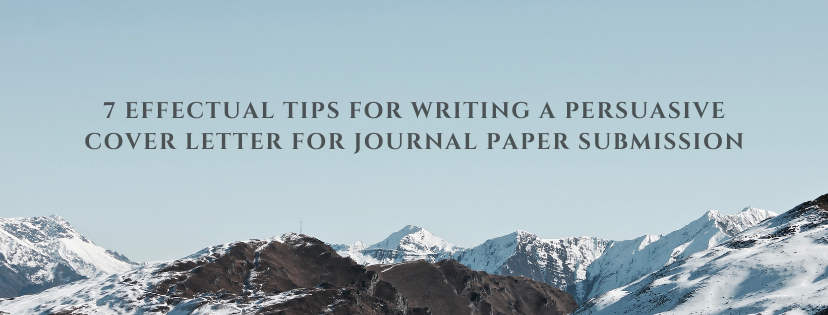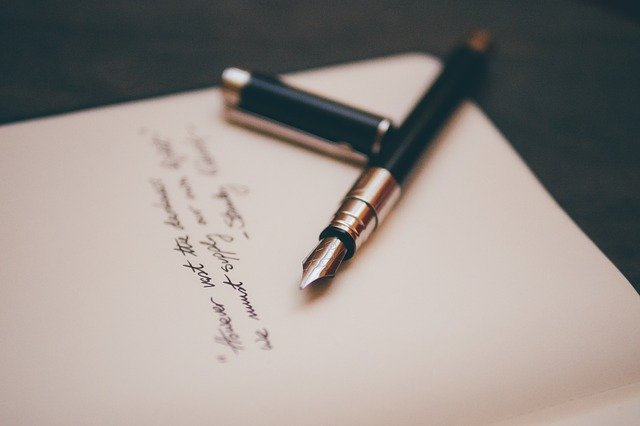The cover letter acts as the first impression that the authors or their work will have on the editor. It can be contemplated as the “sales pitch” of the conducted research and the submitted work. It, therefore, deserves meticulous attention and should never be written half-heartedly. This article discusses how to write a persuasive cover letter for journal submission and presents an easy-to-follow rubric that will help you draft an impeccable cover letter.

This handout provides an easy-to-follow rubric that will help you draft an impeccable cover letter. To give you an opportunity to practice proofreading, we have left a few spelling, punctuation, or grammatical errors in the text. See if you can spot them! If you spot the errors correctly, you will be entitled to a 10% discount.
Prospective authors, both novice and experienced, often peripheralize the cover letter as a journal submission formality and draft the same in a cursory manner. In doing so, they forget that this letter is officially their first direct communication with the journal editor. The cover letter acts as the first impression that the authors or their work will have on the editor. It can be contemplated as the “sales pitch” of the conducted research and the submitted work. It, therefore, deserves meticulous attention and should never be written half-heartedly.
One must not be under the illusion that the journal editor will disregard this letter. Even before going through the submitted paper, the editor may straightforwardly reject the same based on the insufficiency of the cover letter. This is likely when the editor is pedantic and disapproves of the author’s laxity toward writing a proper cover letter. This may also happen when the editor perceives the research as unsatisfactory or plainly derivative. Though a desk rejection purely on the basis of the inadequacy of the cover letter is extremely rare, it shall be noted that if the cover letter fails to intrigue the editor, it may receive a lower priority. Most journals receive a number of submissions every day, and the editors have the challenging task of sifting through them and selecting the best amongst all to send for a review. Journal editors typically seek papers that present novel findings and may prospectively increase the journal’s readership. Thus, the most interesting papers are most often prioritized for review.
Herein, we present an easy-to-follow rubric that will most assuredly help you draft an impeccable cover letter.
Any cover letter submitted to a journal with a paper will be considered incomplete if it fails to include any of the following:
The submitted paper’s title;
Authors’ names in order of occurrence in the paper and their respective affiliations;
Type of paper (review, research, case study, etc.);
A succinct overture of the study and the research problem attempted to be resolved;
Contribution of the research findings in the development of the extant literature in the associated domain;
The mailing and email addresses of the corresponding author;
A clear statement that the paper has not been published elsewhere and is not concurrently submitted to another journal or conference. It shall further be stated that all authors have approved the paper contents and have agreed to submit the paper to the concerned journal.

The most prevalent practice by prospective authors is a reiteration of the contents of their papers’ abstract and conclusion in the cover letter. Only the part that explains why the paper is suitable for the journal and why its potential readers will take interest in the study shall be mentioned.
Omit any segments in the letter with superfluous and irrelevant details and refrain from making the letter verbose. There is no need to remark that you or any other author(/s) have published any paper in that or any other journal, unless the same is essential to be specified. There shall be no room for personal details that are unrelated to the submission.
It is imperative to accentuate the novel aspects of the research in the cover letter and advocate its publication. However, at times, authors take a step ahead and indulge in an unnecessary (read “vexatious”) glorification of their research. Note that only the contribution of the research findings in the development of the extant literature in the associated domain shall be specified in the letter. Strictly abstain from over-embellishment with words such as “one of a kind,” “superlative,” “extraordinary,” “exceptional.” It is best for the editor to decide whether the submitted research is truly extraordinary and worthy of publication.
Prospective authors seldom presume instead of just briefly imparting striking details about their submitted paper, adding words of admiration may influence the editor during decision making. There have been instances where authors addressed the journal or the journal editor using expressions or sentences such as:
“To the most esteemed editor”
“I am submitting an article titled ‘___’ to your overly prestigious journal, the most celebrated journal in the field of ____, publishing the most remarkable findings.”
“I genuinely hope my paper gets published in your extraordinary journal.”
Such flattery will most assuredly not have any impact on the editor’s decision and will only detract him/her from the main body of the cover letter delineating the contents of the paper. However, as a basic etiquette, remember to thank the editor at the end of the letter for his/her time and consideration.
Once the editor has decided to send the submitted paper for peer review, he/she is confronted with the challenging task of selecting potential reviewers. To alleviate the burden on the editor and expedite the process of selection of reviewers, the authors shall name at least five such reviewers and provide their respective affiliations and contact details. These reviewers are supposed to be experts in the relevant field who can ascertain the worth of the submitted paper for publication and provide constructive comments for its improvement. However, it shall be noted that it is up to the editor to contact the listed reviewers. Moreover, in case of any plausible conflict of interest, the authors shall name the reviewers who shall not be sent the paper for feedback.
We assure you that following these basic and straightforward rules will help you draft an impressive cover letter. For giving a thoroughly professional look to your cover letter, consider writing the same on your university or organization’s letterhead.
Once you have completed your letter, do not forget to edit and proofread thoroughly before submitting it. Looking for an expert to polish the language of your otherwise perfect cover letter? Not a native speaker of English or an English-language expert? Be sure to check out our professional editing and proofreading service!
The expert editors of Best Edit & Proof focus on offering manuscripts with proper tone, content, and style of academic writing, and also provide an upscale editing and proofreading service for you. If you consider our pieces of advice, you will witness a notable increase in the chance for your research manuscript to be accepted by the publishers. We work together as an academic writing style guide by bestowing subject-area editing and proofreading around several categorized styles of writing. With the group of our expert editors, you will always find us all set to help you identify the tone and style that your manuscript needs to get a nod from the publishers.
You can also avail of our assistance if you are looking for editors who can format your manuscript, or just check on the particular styles for the formatting task as per the guidelines provided to you, e.g., APA, MLA, or Chicago/Turabian styles. Best Edit & Proof editors and proofreaders provide all sorts of academic writing help, including editing and proofreading services, using our user-friendly website, and a streamlined ordering process.
Kindly visit our order page if you want our subject-area editors or language experts to work on your manuscript to improve its tone and style and give it a perfect academic tone and style through proper editing and proofreading. The process of submitting a paper is very easy and quick. Click here to find out how it works.
Our pricing is based on the type of service you avail of here, be it editing or proofreading. We charge on the basis of the word count of your manuscript that you submit for editing and proofreading and the turnaround time it takes to get it done. If you want to get an instant price quote for your project, copy and paste your document or enter your word count into our pricing calculator.
Contact us to get support with academic editing and proofreading. We have a 24/7 active live chat mode to offer you direct support along with qualified editors to refine and furbish your manuscript.
Follow us on Twitter, LinkedIn, Facebook, Instagram, and Medium.
For more posts, click here.
How to Determine Variability in a Dataset
14.10.2023
How to Determine Central Tendency
19.02.2023
How to Specify Study Variables in Research Papers?
14.01.2023
Population vs Sample | Sampling Methods for a Dissertation
14.01.2023
How to Ensure the Quality of Academic Writing in a Thesis and Dissertation?
04.12.2022
How to Avoid Anthropomorphism in Your Dissertation?
04.11.2022
How to Write a Research Paper After Finishing a Dissertation or a Thesis
28.08.2022
How to Write a Research Methodology Section for a Dissertation and Thesis
07.08.2022
How to Write a Theoretical Framework for a Dissertation and Thesis?
05.08.2022
How to Write Literature Review for a Dissertation and Thesis
02.08.2022

After writing your manuscript, you may likely decide on an editor to perform the final checks on your document. Mostly, authors make the mistake of sending their manuscripts to their editors, without providing adequate information about specifications on the service they seek. With such limited information, your editor may produce an unsatisfactory job with limited information at his/her disposal. Thus, to ensure that your editors provide the best possible service, which will prevent journals from rejecting your manuscripts on the grounds of noncompliance to journal requirements, the following information should be provided beforehand.
Continue Reading
It is common to see scholars submit their articles to the wrong journals or overlook the requirements of a journal and face rejection. In other words, they resort to haphazardness, ruling out any possibility of an ordered approach to the journal selection endeavor. This article aims to organize the randomness, as stated above, by listing five tips for picking a journal. Thus, readers looking to systemize their article submission efforts should implement them perforce.
Continue Reading
Statistical analysis uses quantitative data and explores trends, patterns, and relationships. Thus, it is an indispensable instrument for researchers, states, firms, and many others. This article offers introductory knowledge on statistical analysis for students and researchers. After discussing descriptive and inferential statistics, it covers various research designs.
Continue Reading